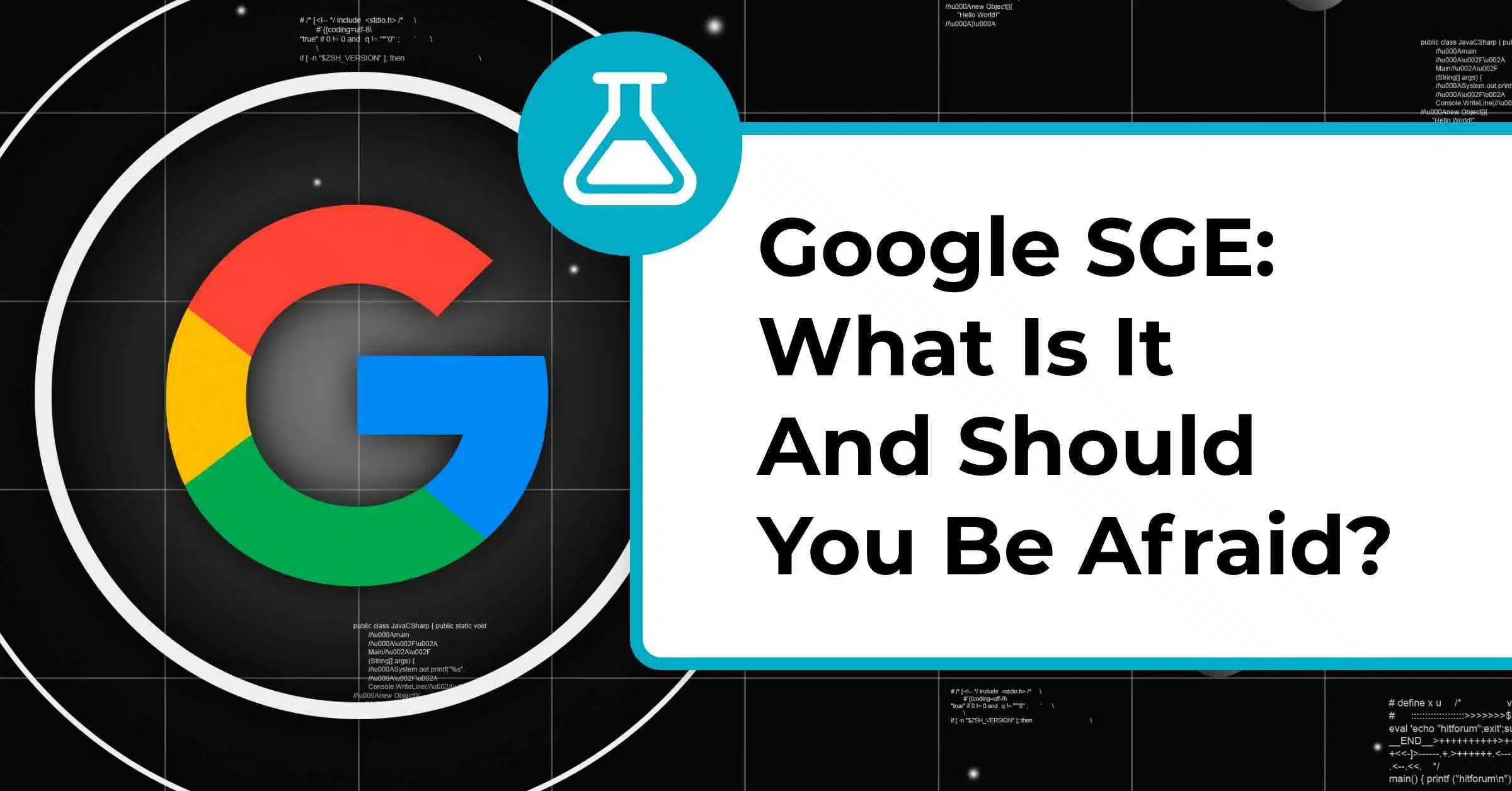
Table of Contents
- Introduction
- Understanding AI and LLMs
- Content Creation on Autopilot (Almost)
- Personalization at Scale
- Chatbots Turn Frustration into Frictionless Service
- The Future is Now, But Use It Wisely
- Google Ads and AI and You
- Avoiding AI Pitfalls in Digital Marketing
- Experience the DOM Difference
AI is not a buzzword or a distant future concept. Although the launch of ChatGPT in early 2023 put AI and Large Language Models (LLMs) into the mainstream, marketers have used AI tools for many years. You could even argue that the entire industry of search engine optimization is really just a way to figure out how to make a website rank highly with the extremely active and very busy artificial intelligence that has powered Google’s search for decades: PageRank.
Regardless of how we got here, we’re in the midst of an AI revolution. It’s a natural impulse of curious creatives everywhere to ask what AI can do for them. We’ve got some old favorites, some new ideas, and some mistakes to avoid.
Understanding AI and LLMs
Artificial intelligence broadly refers to machines or software mimicking cognitive functions that humans associate with the human mind, like learning and problem-solving. In digital marketing, AI powers tools and systems that analyze data, predict trends, automate tasks, and personalize interactions, among other things.
LLMs are a subset of AI technologies that understand, generate, and interpret human language. Think of LLMs as the English majors of the AI family, trained on vast amounts of text data to recognize patterns, nuances, and contexts in language.
While AI encompasses a wide range of technologies, including machine learning, neural networks, and robotics, LLMs are specifically designed for tasks involving natural language processing (NLP), such as content creation, language translation, and customer service automation.
The difference between AI and LLMs is like to comparing a Swiss Army knife to a specialized carving knife. Both are valuable tools in their own right, designed for different tasks but under the same umbrella of technology. In digital marketing, using both AI’s broad capabilities and LLMs’ language proficiency can offer a competitive edge that lets marketers craft strategies that are data-driven and also resonant with their target audience.
Content Creation on Autopilot (Almost)
Here’s something that a lot of eager content marketers figured out about ChatGPT: it can churn out blog posts, product descriptions, and social media captions without writer’s block. LLMs generate content based on very specific specifications, saving its users time and resources.
But we forget about the human in the loop at our peril. An LLM can mimic styles and generate ideas, but it lacks the critical thinking and emotional intelligence to craft the kind of content that really resonates with an audience. Consider them brainstorming partners, not replacements for your creative team.
Personalization at Scale
Personalization is no longer a luxury, it’s a necessity. AI can analyze vast amounts of customer data to predict preferences and deliver tailored experiences. Email campaigns can speak directly to each recipient’s interests, and websites can make recommendations that anticipate their needs. This level of personalization fosters deeper connections and boosts engagement.
But remember, respect for privacy is paramount. Be transparent about data collection and usage, and prioritize ethical practices to build trust with your audience. In some cases, and in some locations, you might not even have a choice–the local laws made that decision for you, and you’d better be compliant.
Chatbots Turn Frustration into Frictionless Service
AI-powered chatbots can handle basic customer inquiries, freeing up your team for complex issues. But poorly designed bots lead to frustration. Ensure your bots understand natural language, offer clear solutions, and escalate seamlessly to human representatives when needed. Remember, chatbots are tools to enhance, not replace, human interaction.
The Future is Now, But Use It Wisely
AI and LLMs are powerful tools, but they’re not magic bullets. Integration requires careful planning, ethical considerations, and human oversight. Use them to augment your creativity, personalize experiences, and streamline tasks. But always remember the human touch is irreplaceable.
Google Ads and AI and You
Google’s Performance Max campaigns leverage AI to optimize ad placements across Google’s platforms, including Search, Display, YouTube, Gmail, and Maps. This innovation builds on the foundations of Smart Bidding. Smart Bidding, a feature that uses machine learning for auction-time bidding to optimize for conversions, paved the way for Performance Max by demonstrating the effectiveness of AI in enhancing advertising outcomes.
Performance Max utilizes AI to automate ad format, placement, and targeting decisions, aiming to achieve the advertisers’ specified goals by analyzing vast amounts of data. Smart Bidding is integral to Performance Max, adjusting bids in real-time based on predictive analytics to maximize conversion potential.
Advertisers utilizing Performance Max have reported significant improvements in campaign performance, with some seeing over a 30% increase in conversions at a comparable cost per action.
Avoiding AI Pitfalls in Digital Marketing
While LLMs offer exciting possibilities for content creation, automation, and personalization, neglecting key considerations can lead to costly mistakes. Here are some pitfalls to avoid:
- Blind Faith in Fact-Checking: LLMs are adept at mimicking human language, but they’re not fact-checkers. While grammatically correct and engaging, the text they generate can contain factual inaccuracies or biases in their training data. Always fact-check and edit LLM-generated content before publishing. Remember, AI amplifies, not replaces, human expertise.
- The “Set-It-and-Forget-It” Fallacy: AI automates tasks, but it isn’t magic. Every AI implementation needs human oversight and guidance. Define clear goals, monitor performance, and adjust strategies as needed. Don’t expect AI to solve problems without your active involvement.
- Black Box Blindness: Many AI tools function like black boxes, making it difficult to understand their decision-making processes. This lack of transparency can lead to biased outputs or unintended consequences. Choose AI solutions with explainable AI features or consult experts to understand how they work.
- Ignoring Ethical Considerations: AI raises ethical concerns, particularly around data privacy and potential biases. Ensure your AI usage complies with regulations and aligns with your brand’s values. Be transparent about data collection and usage, and avoid discriminatory practices.
- Neglecting the Human Touch: While AI excels at automation and data analysis, it lacks the creativity, empathy, and emotional intelligence inherent in human communication. Don’t replace human interaction with AI entirely. Use AI to enhance campaigns, but let human creativity and understanding guide your overall strategy.
- Overhyping Results: The AI hype machine can be tempting, but avoid making exaggerated claims about AI’s capabilities. Focus on realistic outcomes and be transparent about limitations. Overpromising risks damaging trust and credibility.
By understanding these pitfalls and using AI thoughtfully, you can use its true potential to personalize experiences, streamline workflows, and enhance your digital marketing efforts. Remember, AI is a valuable tool, but it’s humans who define its purpose and impact.
Experience the DOM Difference
Don’t let AI become your marketing monster. By keeping these pitfalls in mind, you can harness its power responsibly, avoiding ethical hiccups and maximizing results. Remember, AI is a tool, not a replacement for your marketing savvy. Use it wisely, inject your human touch, and watch your campaigns soar – without getting lost in the algorithm.
If you’re still not sure about how all these AI tools and tricks can help you with your own digital marketing endeavors, DOM is here to help. We’ve been doing this since 2006 and we’ve seen every single trend come and go. We know how and why to use AI and machine learning in digital marketing. We know the pitfalls because we’ve stepped in some of them already. Get in touch with us today for a free digital marketing checkup.
Key Takeaways
- AI’s Deep Roots in Marketing: AI and LLMs have been integral to digital marketing long before their mainstream attention, with SEO being an early form of AI optimization.
- Defining AI and LLMs: Artificial intelligence encompasses a broad range of technologies aimed at emulating human cognitive functions, while LLMs specialize in processing and generating human language, offering unique advantages for content creation and customer interaction in digital marketing.
- Strategic Application of AI: Leveraging AI and LLMs offers a competitive edge by enabling data-driven strategies and language proficiency that resonate deeply with target audiences.
- Content Creation: LLMs can efficiently produce various forms of content but require human oversight to ensure relevance, creativity, and emotional connection.
- Personalization at Scale: AI facilitates unprecedented levels of personalization in marketing, enhancing customer engagement and loyalty through tailored experiences.
- Enhancing Customer Service: Chatbots and AI-driven tools can improve customer service efficiency, but they must be designed to complement, not replace, human interaction.
- Performance Max and Smart Bidding: Google Ads’ innovations, such as Performance Max and Smart Bidding, showcase AI’s role in optimizing advertising campaigns for better performance and ROI.
- Navigating AI Pitfalls: Marketers must be cautious of over-reliance on AI for fact-checking, maintaining human oversight, addressing ethical concerns, and ensuring transparency and fairness in AI applications.
- Continuous Learning and Adaptation: The dynamic nature of AI in digital marketing requires ongoing education and adjustment to leverage new technologies effectively and ethically.
- The Human Element Remains Crucial: Despite AI’s advancements, the human touch in creativity, empathy, and strategic decision-making remains irreplaceable in digital marketing.


